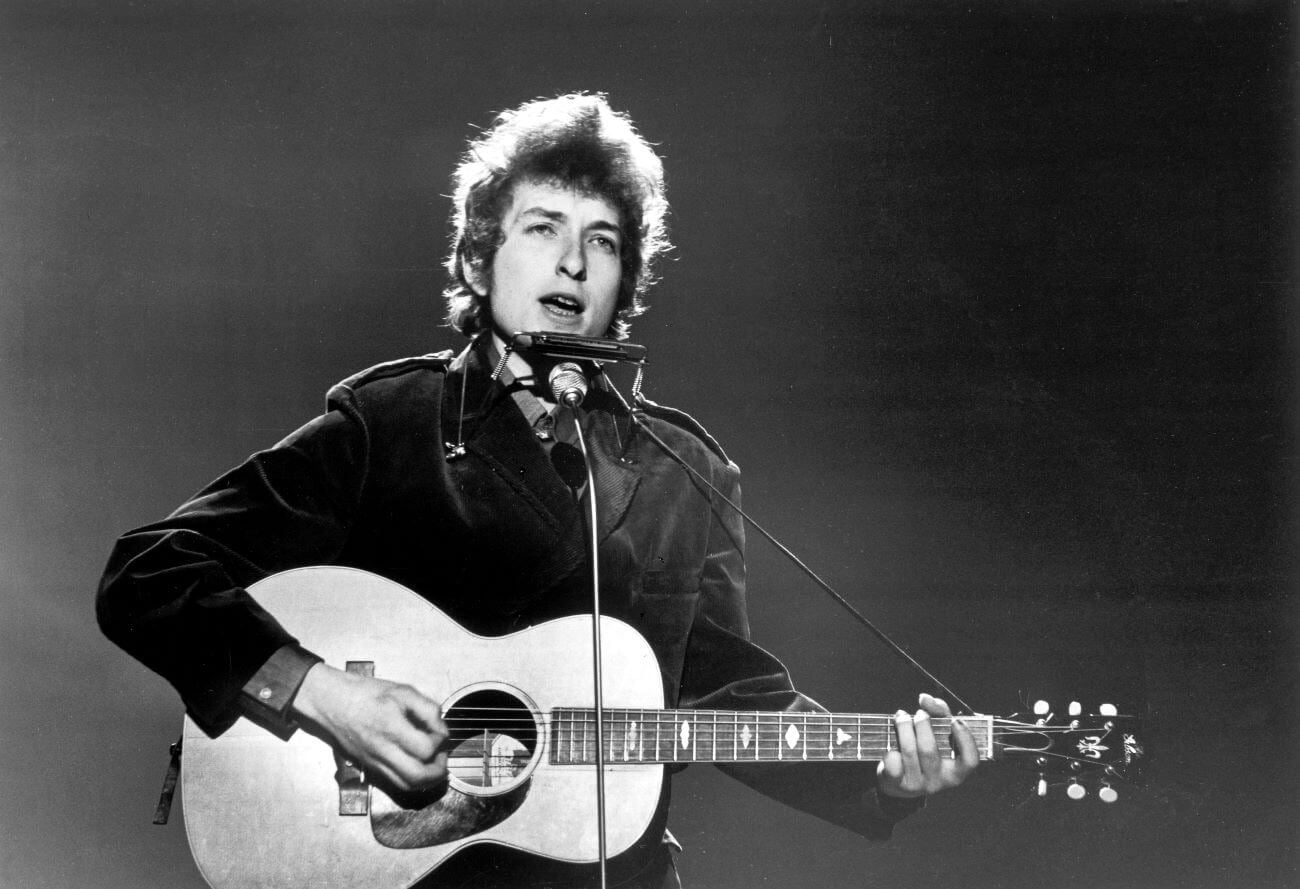
Bob Dylan’s Best 5 Protest Songs, Ranked
In 1963, Bob Dylan’s second album, The Freewheelin’ Bob Dylan, brought the young artist national attention, particularly for his protest songs. On several subsequent albums, Dylan tackled subjects such as racial injustice and the Cold War. While he moved away from protest songs by the mid-1960s, just several years into his career, he returned to them on occasion. Dylan himself said he doesn’t consider himself a protest singer, but he made an indelible impact on the genre. Here are five of his best protest songs.

5. ‘The Times They Are A-Changin”
Dylan moved to New York City in 1961, 19 years old and determined to meet his idol, Woody Guthrie. “The Times They Are A-Changin'” is evocative of Guthrie’s work to great effect. Dylan released the song in 1964, at a time of rumbling social change, and he concisely spoke to the era.
“Come senators, congressmen, please heed the call/Don’t stand in the doorway, don’t block up the hall/For he that gets hurt will be he who has stalled/The battle outside ragin’/Will soon shake your windows and rattle your walls/For the times, they are a-changin’.”
The song, which Dylan wrote in his early twenties, still feels relevant.
“I wanted to write a big song, with short concise verses that piled up on each other in a hypnotic way,” Dylan told Cameron Crowe, as recorded in the album notes for Biograph. “The civil rights movement and the folk music movement were pretty close for a while and allied together at that time. Almost everyone knew everyone else. I had to play this song on the same night that President Kennedy died. Somehow it became a constant opening song and remained that for a long time.”
4. ‘Blowin’ in the Wind’
Dylan released “Blowin’ in the Wind” in 1963, and the song put him on the map. It features Dylan on guitar and harmonica, asking a series of hypothetical questions.
“Yes, and how many years must a mountain exist/Before it is washed to the sea?/And how many years can some people exist/Before they’re allowed to be free?/Yes, and how many times can a man turn his head/And pretend that he just doesn’t see?”
The song, which explored questions of peace and freedom, quickly became an anthem of the civil rights and anti-war movements. Peter, Paul, and Mary, who covered the song, performed it at the March on Washington in 1963.
3. ‘The Lonesome Death of Hattie Carroll’
The beauty and endurance of “The Times They Are A-Changin'” and “Blowin’ in the Wind” lie in their broad applicability. Dylan’s 1964 song “The Lonesome Death of Hattie Carroll” was topical and pointed.
In 1963, Hattie Carroll, a Black woman, was killed by William Zantzinger, a white man, after he struck her with a cane. In the song, Dylan describes the incident, Zantzinger’s subsequent manslaughter charge, and his six-month prison sentence. He sings of Zantzinger (at twenty-four years/Owns a tobacco farm of six hundred acres/With rich wealthy parents who provide and protect him) and Carroll (a maid of the kitchen/She was fifty-one years old and gave birth to ten children).
The song brings attention to Carroll, an oft-overlooked victim of racist violence. Dylan also firmly places blame on Zantzinger, something he avoided in later protest songs.
“Oh, but you who philosophize, disgrace and criticize all fears/Bury the rag deep in your face, for now’s the time for your tears,” he sings at the end of the song.
2. ‘Hurricane’
1976’s “Hurricane” is one of Dylan’s rare protest songs that came after the early 1960s. In the eight-minute song, Dylan addresses the imprisonment of boxer Rubin “Hurricane” Carter, who was arrested for triple homicide in 1966. He asserts that racial profiling led to an unjust trial and wrongful imprisonment for Carter. Dylan wrote the song after reading Carter’s autobiography and meeting with him in prison.
“How can the life of such a man/Be in the palm of some fool’s hand?/To see him obviously framed/Couldn’t help but make me feel ashamed to live in a land/Where justice is a game.”
The song is powerful and cinematic, its racing tune and Dylan’s impassioned singing making it one of his best.
1. ‘Masters of War’
Dylan’s best protest song, and perhaps one of the best protest songs of all time, is 1963’s “Masters of War.” In it, Dylan sings about the Cold War and the nuclear stockpiling that cast an uneasy shadow over the era.
“[It] is supposed to be a pacifistic song against war,” he told USA Today in 2001. “It’s not an anti-war song. It’s speaking against what Eisenhower was calling a military industrial complex as he was making his exit from the presidency. That spirit was in the air, and I picked it up.”
He was in his early twenties when he wrote it, but it is Dylan at his best and angriest. He is unflinching in his condemnation of the military industrial complex (“even Jesus would never/forgive what you do”), and he wants listeners to feel the same.
“All the money you made/Will never buy back your soul/And I hope that you die/And your death will come soon/I’ll follow your casket/By the pale afternoon/And I’ll watch while you’re lowered/Down to your deathbed/And I’ll stand over your grave/’ Til I’m sure that you’re dead.”


